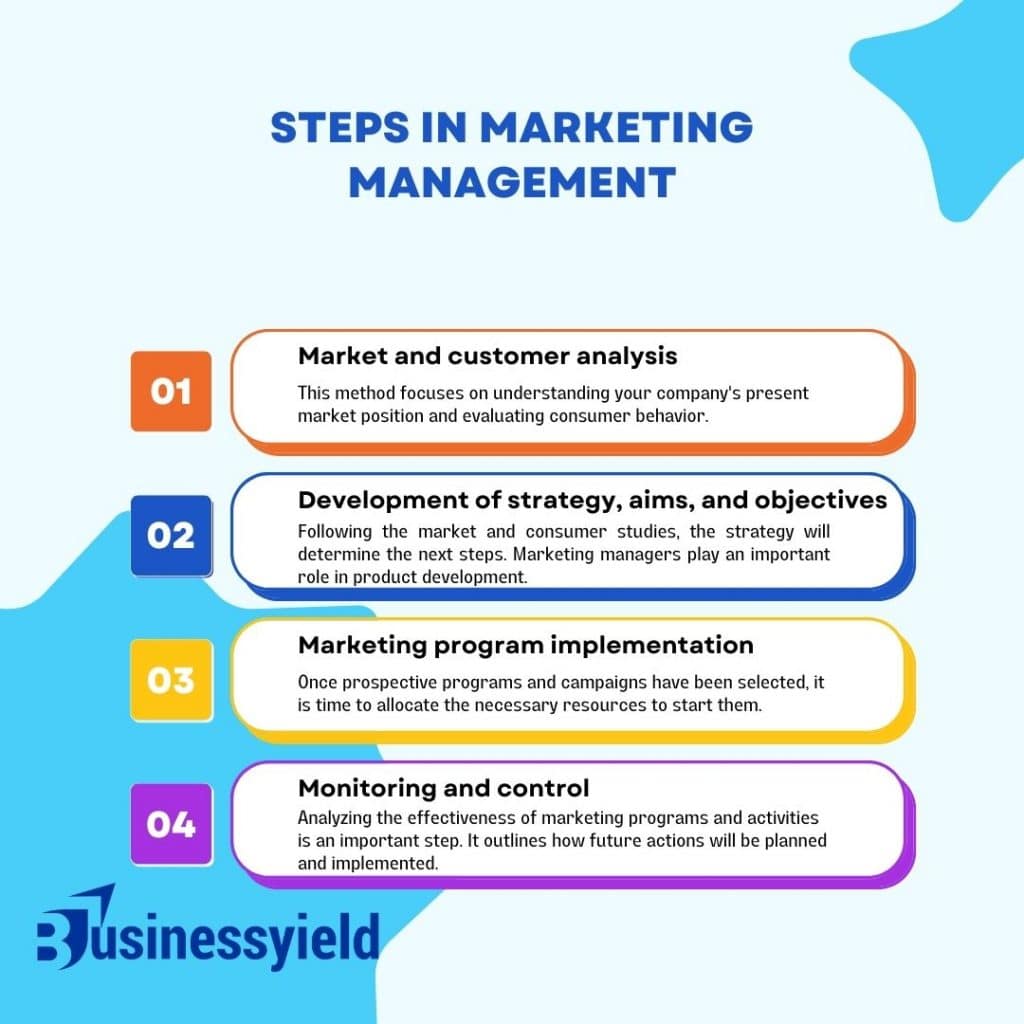As someone who has worked in marketing management for over a decade, I have seen firsthand its progress and the critical role it plays in guiding firms to success. In this article, I hope to share my path and ideas, shed light on the complexities of marketing management, and provide significant lessons learned from my experiences.
Let’s start by defining marketing management
What is Marketing Management?
Marketing in marketing management is the process of developing, implementing, and monitoring strategies for creating, promoting, and selling products or services that suit the needs of the target customers.
It strives to build long-term customer relationships, project a positive image in the marketplace, and boost sales and profits through better marketing methods.
Marketing management is more than simply a job title; it’s a comprehensive field that combines strategy, analysis, innovation, and leadership. Over the years, I’ve learned that good marketing management requires not just a thorough awareness of the industry and consumer behavior but also the ability to adapt to ever-changing digital landscapes and customer preferences.
Marketing managers study data on potential customers, create marketing strategies, and oversee the entire marketing process to meet their organization’s goals.
Importance of Marketing Management
Marketing management is critical to the success of any organization. It entails planning, implementing, and overseeing numerous marketing operations that promote a product or service to its intended audience.
Effective marketing management enables a company to establish a strong brand image, increase client loyalty, and generate income.
Companies may develop and provide products and services that satisfy the expectations of their target market by first knowing their needs and preferences.
Furthermore, marketing management enables organizations to keep ahead of the competition by constantly studying market trends and implementing novel tactics.
As a result, investing in marketing management is critical for any firm seeking sustainable growth and long-term success.
Key Elements of Marketing Management
To better grasp how marketing management is carried out, one must first understand the fundamental principles that comprise the subject. Here is an overview of the components that comprise a business’s marketing structure.
#1. Marketing Mix
Marketing relies on what are dubbed the four Ps.
- Product
- Price
- Place
- Promotion
The four Ps constitute the marketing mix that underpins any marketing strategy. If you follow them, you will use both the soft science of psychology and the hard physical factors to influence customers. Psychological components reveal what the buyer wants and impact their purchasing behaviors, leading them to choose your product or service. Physical elements enhance your product or service, such as by optimizing your distribution chain or boosting product quality.
#2. Marketing Strategy
A marketing strategy is a long-term plan that describes how a firm will interact with its customers, including marketing tasks such as market research, branding, distribution channels, advertising, and price. A marketing strategy is a high-level overview that includes the marketing plan, budget, and campaign. It is recommended to utilize a combination of pull and push marketing methods.
#3. Marketing Plan
A marketing plan is a document outlining a company’s overall marketing strategy. It describes in greater depth how the marketing strategy will be implemented. It also comprises the marketing budget, which will cover the expenses for these initiatives. Our marketing strategy template is great for getting started.
#4. Marketing Budget
A marketing budget describes how much money is needed to cover a company’s marketing efforts. To avoid cost overruns in your marketing initiatives, you should do a detailed cost estimation of activities such as advertising before establishing a budget. Our marketing budget form is an excellent tool for kicking off the budgeting process.
#5. Marketing Campaign
A marketing campaign is a collection of actions or approaches that comprise a marketing plan. Marketing initiatives can vary in scope and cost. A marketing campaign can be created to promote a company, brand, or specific product.
A marketing campaign can include any of these marketing activities. Here are just a few examples of marketing strategies you might employ.
1. Digital marketing
Digital marketing refers to a wide range of activities, including content marketing, social media marketing, SEO, and SEM. These digital marketing domains rely on data analysis and metrics to determine performance.
2. Paid advertising
refers to any advertising that you pay for, such as print media or digital placement, and may include PPC (pay-per-click).
3. Email marketing
As the name implies, email marketing is a component of digital marketing that involves engaging potential customers through large-scale email distribution and A/B testing.
4. Account-based marketing
Account-based marketing is a marketing technique in which marketing and sales teams work together to discover high-value accounts and launch targeted marketing campaigns.
5. Cause marketing
Cause marketing aims to connect with your target audience and tie your product or service to a societal issue or cause.
6. Relationship Marketing
This aims to develop and strengthen existing consumer ties to increase brand loyalty.
7. Undercover Marketing
This is a stealth method in which consumers are unaware that they are being advertised.
8. Word of mouth
Word of mouth is a critical marketing strategy, but it is difficult to implement. That’s because it relies on customers having a positive opinion of your product or service, which increases sales and loyalty.
9. Online Marketing
Develop a content plan to promote your products or services using online and other digital channels.
10. Transactional Marketing
In transactional marketing, you use coupons, discounts, and events to increase sales and attract your target demographic via promotions.
11. Diversity Marketing
When you have a diverse range of customers, you must vary your marketing efforts to accommodate ethnic and religious beliefs.
7 Marketing Management Functions
The seven marketing functions serve as the foundation for effective marketing management. This is because seven core areas encompass all marketing management tasks. Handling all seven areas might be difficult, which is why it is recommended to use project management tools for marketing.
#1. Promotion
This refers to all marketing actions that increase brand recognition. Promotion can be targeted at a certain brand, product, or service. There are several types of promotions, including digital advertising, content marketing, public relations, and events. Making a creative brief is an excellent way to organize your promotion efforts.
#2. Selling
Marketing and sales are tightly intertwined. Typically, marketing teams develop a marketing funnel strategy to create leads and revenue for their organizations. To sustain lucrative customer relationships, keep a marketing calendar and a customer relationship management (CRM) system in place.
#3. Product Management
Marketing management entails collaborating closely with product management teams. Both teams must provide input to each other to create a product that fits the needs of both the firm and its customers. Product development teams are concerned with both the functional features of the product and keeping costs low, while marketing managers must assist in producing goods that are customized to the needs of the target client.
#4. Pricing
Marketing management specialists must create a price structure for a business. Demand planning, costs, and the brand’s competitive environment are just a few factors that affect pricing decisions.
#5. Market Research
Market research is the process of examining customer data, such as demographics, to create a marketing strategy that meets their demands. Market research will help you understand your target audience’s purchasing habits, allowing you to determine the best marketing strategy to reach them.
#6. Finance and Budgeting
Securing money, forecasting costs, and developing a marketing budget are all critical aspects of marketing management. A marketing strategy cannot be carried out without funding and budgeting.
#7. Distribution
Choosing the right distribution channels to sell your goods is a vital aspect of marketing management. You have the option of opening a physical store, using online methods or combining the two.
You can check out this marketing management checklist and adapt it to your marketing strategy.
What are the Steps in Marketing Management?

Here are the procedures I utilized to maximize marketing activities from all angles.:
- Market and customer analysis: This method focuses on understanding your company’s present market position and evaluating consumer behavior.
- Development of strategy, aims, and objectives: Where does a company wish to go? How does it intend to get there? Following the market and consumer studies, the strategy will determine the next steps. Marketing managers play an important role in product development. When it comes to explaining a product’s benefits, these pros assist in creating poignant, on-brand messages.
- Marketing program implementation: Once prospective programs and campaigns have been selected, it is time to allocate the necessary resources to start them.
- Monitoring and control: Analyzing the effectiveness of marketing programs and activities is an important step. It outlines how future actions will be planned and implemented.
Challenges In Marketing Management
Navigating through different hurdles, such as budget constraints and the rapid expansion of digital marketing platforms, necessitated a combination of adaptability, inventiveness, and strategic vision. Using agile approaches enabled us to be more responsive and adaptable in our strategies. Keeping up with digital marketing developments necessitated constant updates to our abilities and plans to embrace the most recent tools and platforms, such as programmatic advertising and marketing automation.
The Effects of Digital Transformation on Marketing Management
The digital transition fundamentally changed how we handled marketing management. It needed a change toward digital literacy, with an emphasis on utilizing digital channels such as social media, SEO, and data analytics. These technologies proved important for understanding consumer behavior and preferences, allowing us to modify our efforts to maximize engagement and conversion. The objective was to seamlessly incorporate these digital methods with our traditional marketing efforts, resulting in a unified and effective marketing mix.
Future Trends and the Path Forward for Marketing Management
Looking ahead, I think that themes such as AI, customization, and sustainability will play a significant role in defining marketing management. AI and machine learning are poised to transform the way we evaluate data and personalize client experiences. Similarly, an increasing emphasis on sustainability and ethical marketing is influencing how firms interact with their customers and society as a whole. To be relevant and effective as a marketing manager, you must embrace these trends, constantly develop new skills, and adjust strategies to meet the changing needs of the market and consumers.
Who are the Most Influential Marketing Managers?
- Philip Kotler, known as the “Father of Modern Marketing,” pioneered concepts and teachings that transformed marketing techniques, emphasizing customer-centric methods and the critical 4 Ps of marketing.
- Sheryl Sandberg, Facebook’s COO, changed digital marketing and campaigned for women’s leadership with her insights, particularly in her book “Lean In.”
- Ana Andjelic – Andjelic’s expertise in luxury branding and digital transformation challenged marketing norms, providing new perspectives on consumer behavior and the impact of technology.
- Steve Jobs – Although not generally thought of as a marketing manager, Jobs was an expert in branding and product marketing. He helped develop Apple’s unique brand identity and launch revolutionary devices such as the iPod, iPhone, and iPad.
- Seth Godin is a well-known author and speaker on marketing topics. He has produced over 20 marketing books and has long been regarded as an industry thought leader.
- Keith Weed is the former Chief Marketing Officer at Unilever, one of the world’s leading consumer product businesses. He oversaw Unilever’s global marketing strategy and was named by Forbes in 2017 as one of the world’s most influential marketers.
- Bozoma Saint John was a trailblazing CEO at Apple, Uber, and PepsiCo, whose inventive campaigns and diversity advocacy transformed brand-building and cultural ties.
Marketing Management Careers
Marketing management jobs are available in almost any industry that requires marketing efforts to earn income and create a brand. Marketing management salaries vary by job title, region, credentials, and sector.
Begin your career research by reviewing the job titles listed below. Glassdoor salary average estimates for January 2023 include anticipated basic pay as well as supplemental pay such as bonuses, commissions, and profit sharing.
#1. Marketing Manager
Marketing managers assist businesses in building strategies and identifying target audiences for their products or services. They manage campaigns and other marketing initiatives, use metrics to assess the performance of marketing programs, and collaborate with members of the marketing department, ad sales professionals, the financial department, and others to coordinate and finance marketing campaigns.
The average annual wage (US) is $75,594.
Social media managers generate material for social media networks depending on a company’s marketing objectives. They may utilize social media metrics to target their efforts while also monitoring and measuring post-performance. Social media managers are responsible for engaging customers and preserving a company’s brand through social media networks.
The average annual wage (US) is $52,044.
#3. Brand manager
Brand managers create and implement brand strategy for the firms for which they work, as well as approaches for achieving brand business objectives. Staying up-to-date on marketing trends and competition activity, establishing brand narrative and assets, and assisting with campaign management are all part of the job. Brand managers may collaborate with marketing, sales, and creative teams to provide an engaging brand experience to their target audience.
The average annual wage (US) is $75,512.
#4. Marketing Director
A director of marketing is an executive who makes high-level decisions about a company’s marketing operations. This position oversees all ad campaigns and evaluates indicators such as return on investment (ROI) to assess the efficacy of marketing activities and make adjustments as needed. A marketing director often works above a marketing manager and other members of a marketing department.
The average annual wage (US) is $201,996.
#5. Chief Marketing Officers
Chief marketing officers (CMOs) are corporate executives who create marketing plans and strategies to increase a company’s sales. This function is concerned with a company’s future, namely how and where marketing efforts should be directed to benefit the company both now and in the future. A CMO often reports to the CEO or COO.
The average annual wage (US) is $401,259
How To Get Into Marketing Management
To work in marketing management, you must have a bachelor’s degree in marketing or a related discipline, as well as professional experience in marketing, business, advertising, or something similar. Because marketing management roles are upper-level managerial positions, some positions, such as CMO, may require a master’s degree and substantial marketing professional experience to advance.
#1. Get a bachelor’s degree.
The majority of marketing management positions require a bachelor’s degree in marketing or a related business subject.
While getting your degree, you might want to take classes in consumer behavior, public relations, computer science, and marketing research. Depending on your institution, you might be able to concentrate on a specific marketing field. Some students may complete internships while pursuing a degree, which gives them hands-on learning opportunities and improves their résumé. In some situations, firms may hire interns after graduation, so take advantage of this chance if your degree program does not mandate it.
#2. Develop in-demand marketing skills
Your degree program should provide you with numerous applicable technical and workplace skills. Be careful to research the qualities that employers look for in a marketing leader. For example, ZipRecruiter’s data collected from hundreds of real marketing manager job descriptions shows that the ten most common abilities include:
- Collaboration
- Digital skills
- Innovation
- Marketing Strategy
- Social Media
- Communication
- Marketing Campaigns
- Marketing Digital
- Management of Projects
- Marketing Planning
Other talents to prioritize include content management systems (CMS), digital ad management, search engine optimization, customer relationship management (CRM), A/B testing, online analytics, creativity, organizational abilities, and problem-solving.
#3. Gain marketing experience.
Getting marketing experience can be a terrific opportunity to put your skills and knowledge from your degree curriculum and other courses to use. Employers want to see that you have firsthand expertise in all parts of marketing, advertising, and team management. Experience displays ability in both technical and interpersonal skills. Having professional references might also help you get a position in marketing management.
Here are four approaches to obtaining marketing experience:
- Getting an entry-level marketing job.
- Attending networking events, both online and in person.
- Finding a mentor with experience in marketing management.
- Interning with a local company’s marketing department
#4. Obtain a marketing certification.
Certifications and credentials can increase your chances of landing a job in marketing management by demonstrating competency in essential skills that employers desire. These qualifications are accessible for a variety of job titles, industries, and specialties within marketing management. Certification and certificate programs often include several trainings and courses. Some programs may finish with a qualifying examination.
#5. Join a marketing association
Joining a professional marketing group, such as the American Marketing Association (AMA) or the American Association of Advertising Agencies, can provide various advantages, including:
- Career assistance when seeking a job.
- Invitations for events and conferences
- Access free resources, such as webinars and other training materials.
- Access to the most recent marketing trends and news.
Conclusion
Marketing management is an ongoing process of learning and adapting. My experience has shown me that success in my sector necessitates a combination of strategic thinking, creativity, and the ability to motivate and inspire a team. As the marketing landscape evolves, so should the talents and techniques of competent marketing managers.
- 11 Best Digital Marketing Companies for Small Businesses
- BEST WAYS TO ADVERTISE YOUR BUSINESS: 10 Tips To Advertise Your Business
- SOCIAL MEDIA CAMPAIGNS: The Ultimate Guide to Social Media Marketing Campaigns
- WHAT IS ADVERTISING? All You Should Know






